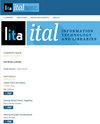图书馆弹性文化建设
IF 1.5
4区 管理学
Q3 COMPUTER SCIENCE, INFORMATION SYSTEMS
引用次数: 0
摘要
随着我们处理新冠肺炎疫情对该行业的影响,我们将转向将更大的灵活性与我们自己的工作结合到基于赞助人的服务中。在这篇社论中,明尼苏达州明尼阿波利斯市Minitex的技术总监Paul Swanson认为,在我们的图书馆中灌输韧性文化将帮助我们更容易适应这些变化并接受新的变化。本文章由计算机程序翻译,如有差异,请以英文原文为准。
Building a Culture of Resilience in Libraries
As we process the impacts that the COVID-19 pandemic has had on the profession, we will be turning towards incorporating more flexibility into patron-based services along with our own work. In this editorial, Paul Swanson, Technology Director for Minitex in Minneapolis, MN, argues that instilling a culture of resilience in our libraries will help us to more easily adapt to these changes and take on new ones.
求助全文
通过发布文献求助,成功后即可免费获取论文全文。
去求助
来源期刊

Information Technology and Libraries
管理科学-计算机:信息系统
CiteScore
2.90
自引率
5.60%
发文量
25
审稿时长
1 months
期刊介绍:
Information Technology and Libraries publishes original material related to all aspects of information technology in all types of libraries. Topic areas include, but are not limited to, library automation, digital libraries, metadata, identity management, distributed systems and networks, computer security, intellectual property rights, technical standards, geographic information systems, desktop applications, information discovery tools, web-scale library services, cloud computing, digital preservation, data curation, virtualization, search-engine optimization, emerging technologies, social networking, open data, the semantic web, mobile services and applications, usability, universal access to technology, library consortia, vendor relations, and digital humanities.
 求助内容:
求助内容: 应助结果提醒方式:
应助结果提醒方式:


